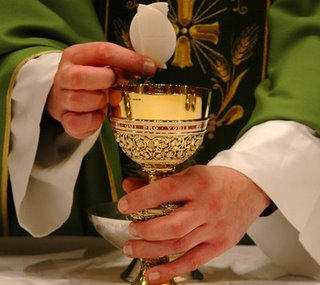A Pepper Grinder Post
Communion Every Week
In my last post, I started a two-part series about what I like about the Anglicans, and I talked about how the role of priest in the Anglican Church (at least in my limited experience) tends to take our focus off the person standing in front of the church, and put it onto Christ. I feel a little bad making this just a two-part series. It seems to imply that I think there are two good things about the Anglicans, and only two.
There are actually other things I like about this group of Christians. For example, I find much of the liturgy (the words that we and the priests pray and say each week in church) to be very powerful and Christ-centered. I love the fact that, in my church at least, we have four readings of Bible passages during the service (two from the Old Testament, with one of those being from the Psalms; and two from the New Testament, with one being from the Gospels). I love the fact that while Anglicans believe that our actions matter, they act as though what Christ has done and what the Holy Spirit does in our lives is the most important thing.
 However, with most of the things I just mentioned, I felt as though I would just be saying something like, "Anglicans do this, and I think it's cool." I'm also hesitant to spend too much time talking about one denomination, when I sometimes feel that God works among his people in spite of our denominational boundaries. But, I did want to talk about how communion is seen in the Anglican Church (once again, with the caveat that I am kind of an Anglican newbie). I have been to some churches where communion was celebrated once a month, and others where they did it once every three months or even less than that.
However, with most of the things I just mentioned, I felt as though I would just be saying something like, "Anglicans do this, and I think it's cool." I'm also hesitant to spend too much time talking about one denomination, when I sometimes feel that God works among his people in spite of our denominational boundaries. But, I did want to talk about how communion is seen in the Anglican Church (once again, with the caveat that I am kind of an Anglican newbie). I have been to some churches where communion was celebrated once a month, and others where they did it once every three months or even less than that.
In those other churches, communion always felt like an add-on. Attend First Baptist Church today, and, for the price of a normal service, you'll also get communion! In these churches, communion usually felt awkward to me. It tended to feel like they were thinking, "Well, Jesus said to do it, so I guess we'd better do it every now and then." In most churches I've been to, the sermon was the center of everything, with worship possibly coming in second. Now, I like a good sermon, and I think God-centered worship is great, but what I love about the Anglican church we're attending is that neither the sermon nor the worship is the center of the service.
Everything in the service builds up to one thing. We start by confessing and repenting of our sins, so we can be on good terms with God. Then we move on to expressing our love and reverence for God, to draw closer to him. Then we hear the teaching of the Bible, to understand how God wants us to live. And then comes the climax: Christ gives us his very own body to eat and his very own blood to drink. This sounds like a horrible thing, and it is. A perfect man who had done nothing wrong had to die willingly, so that we, who have done countless things wrong, could be forgiven. Not only did Christ have to do this, but we have to accept it so completely that we ingest his very being.
In the Old Testament, the people making the offerings were given the meat of some types of offerings to eat.* The blood, on the other hand, could never be drunk. It contained the life of the animal and must be poured out on the ground before God. (This is why, for meat to be Kosher, the slaughtering of an animal must be overseen by a rabbi: he must ensure that the animal is killed in such a way that none of the blood remains in the meat.) And yet, God has given us the flesh, not of some animal, but of God's son. God has given us the very lifeblood of his son to drink.
 If this type of cannibalism repels us, imagine how it would have repelled an observant Jew of Jesus's day. Actually, we don't need to use our imaginations, for we're told of the reactions of many of the people who were following Jesus, in the sixth chapter of the Gospel of John. After Jesus had presented the teaching that unless people ate his flesh and drank his blood, they would not be spiritually alive, we are told: "On hearing it, many of his disciples said, 'This is a hard teaching. Who can accept it?'" (John 6:60, NIV) Then, when Jesus refused to soften his teaching on this, we read: "From this time many of his disciples turned back and no longer followed him." (John 6:66, NIV)
If this type of cannibalism repels us, imagine how it would have repelled an observant Jew of Jesus's day. Actually, we don't need to use our imaginations, for we're told of the reactions of many of the people who were following Jesus, in the sixth chapter of the Gospel of John. After Jesus had presented the teaching that unless people ate his flesh and drank his blood, they would not be spiritually alive, we are told: "On hearing it, many of his disciples said, 'This is a hard teaching. Who can accept it?'" (John 6:60, NIV) Then, when Jesus refused to soften his teaching on this, we read: "From this time many of his disciples turned back and no longer followed him." (John 6:66, NIV)
It is precisely this offensive and gruesome reminder of the horrible results of my sin and the free offer of Christ's grace and forgiveness that confronts me every Sunday.
In other Protestant churches I have attended, I often felt that the message was something like, "Pray to receive Christ, and then live a good Christian life, and you'll be fine." In the Anglican Church, the message I hear is: "You have no hope apart from Christ, but Christ has offered himself freely to you. Take Christ and live."
One of my favorite parts of the service in the church I attend (I'm told these words are also part of the Roman Catholic Mass) are the last words the congregation says before taking communion: "Lord, I am not worthy to receive you, but only say the word and I shall be healed." I want to live my life for Christ and do what's right, but I know I need Christ's healing, Christ's forgiveness, Christ's life. I don't just need it once or even four times a year. I need it constantly.
- Pepper
Posted 2018-10-07
*Thanks to Mrs. Pepper for pointing out the parallel between communion and the eating of Old Testament sacrifices.
*Image Credits: Communion from www.southwest.life
